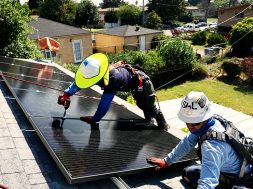
Chandigarh Powers Ahead: Expanding Rooftop Solar for a Sustainable Future – EQ
In Short : Chandigarh is accelerating its rooftop solar expansion under the RESCO model, allowing residents to install solar plants without upfront costs. The city seeks approval for 5-10 kW installations, exceeding national norms. With plans to solarize 1,500 government homes by 2024 and 4,000 more later, Chandigarh aims to generate 100 MWp solar power by 2025.
In Detail : Chandigarh is making significant progress in expanding rooftop solar energy adoption. Under the Renewable Energy Service Company (RESCO) model, residents can install solar plants with no upfront costs, paying a fixed rate per unit of electricity over a 22-year contract. The administration has sought approval to install solar plants ranging from 5 to 10 kilowatts, exceeding the existing 3 kW subsidy limit.
To accelerate the transition, the Chandigarh Renewable Energy and Science & Technology Promotion Society (CREST) is working on installing rooftop solar plants on approximately 1,500 government houses. The goal is to complete these installations by December 2024. This initiative is part of a broader strategy to achieve full rooftop solar saturation for government buildings by the end of 2024 and extend it to private properties by December 2025.
In addition to the 1,500 installations, plans are in place to equip around 4,000 more government houses with rooftop solar panels. These efforts are expected to contribute an estimated 12 megawatt peak (MWp) of green energy to the city’s overall capacity. With these developments, Chandigarh is working toward its target of generating 100 MWp of solar power by 2025, reinforcing its vision of becoming a model solar city.
The RESCO model provides a cost-effective and accessible solution for consumers. With no initial investment required, residents benefit from lower electricity costs while contributing to a greener energy mix. Under this agreement, surplus energy generated by solar panels will be fed back into the grid through net metering, further optimizing electricity distribution and reducing dependence on conventional power sources.
These initiatives reflect Chandigarh’s commitment to promoting sustainable energy solutions and reducing carbon emissions. By engaging both government institutions and private households, the city is ensuring widespread participation in its renewable energy transition. The push for rooftop solar energy is not only an environmental effort but also a step toward long-term energy security and economic benefits.
As the projects move forward, Chandigarh expects to set an example for other cities in India. The successful implementation of large-scale rooftop solar installations will demonstrate the feasibility of renewable energy adoption in urban areas. By embracing solar power, Chandigarh is paving the way for a more sustainable and resilient energy future.












